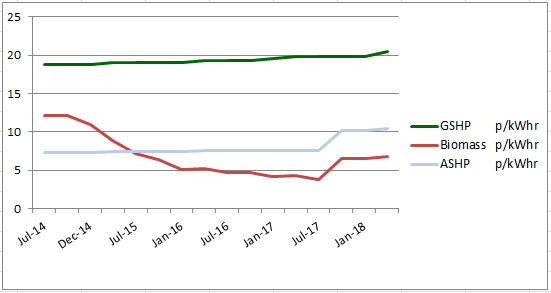Renewable Heat Incentive – Domestic RHI – paid over 7 years
Owners of ground source heat pumps systems (and other eligible renewable heat technologies) installed in domestic properties can apply for RHI – a financial incentive receivable over seven years. The domestic RHI applies for all ground source heat pumps installed since 15 July 2009.
DECC published its Domestic RHI Policy on 12 July 2013. RHI for domestic buildings applies from 9 April 2014. Renewable heat installations can now receive a cashback subsidy of 20.89 pence per kilowatt hour used – for the first seven years of the equipment used.
The RHI tariff table below shows the technologies that are eligible for domestic RHI and the tariffs for each technology, (including the degressions that apply only to biomass installations). The RHI provides a major incentive for owners to invest in ground source heat pumps and solar thermal renewable heat technologies from now until the RHI ends in March 2022. The tariffs shown below are based on pence/kWh of renewable heat delivered. The rates are relevant to those considering investment in renewable energy systems. The rates vary with the technology used as follows:
| RHI Domestic over 7 years |
p/kWh Jan 15 |
p/kWh Apr 15 |
p/kWh Jul 15 |
p/kWh Oct 15 |
p/kWh Jan 16 |
p/kWh Apr 16 |
p/kWh Jul 16 |
p/kWh Jan 17 |
p/kWh Apr 17 |
p/kWh Jul 17 |
p/kWh Oct 17 |
p/kWh Apr 18 |
p/kWh Apr 19 |
p/kWh Apr 20 |
| Solar thermal | 19.20 | 19.51 | 19.51 | 19.51 | 19.51 | 19.74 | 19.74 | 19.74 | 20.06 | 20.06 | 20.06 | 20.66 | 21.09 | 21.36 |
| GSHP | 18.80 | 19.10 | 19.10 | 19.10 | 19.10 | 19.33 | 19.33 | 19.55 | 19.86 | 19.86 | 19.86 | 20.46 | 20.89 | 21.16 |
| ASHP | 7.3 | 7.42 | 7.42 | 7.42 | 7.42 | 7.51 | 7.51 | 7.51 | 7.63 | 7.63 | 10.18 | 10.49 | 10.71 | 10.85 |
| Biomass | 10.98² | 8.93² | 7.14² | 6.43² | 5.14² | 5.21² | 4.68² | 4.21² | 4.28² | 3.85² | 6.54² | 6.74² | 6.88² | 6.97² |
To receive RHI for a domestic building, each system must be installed by an MCS certified installer.
Each domestic building must show an Energy Performance Certificate to evidence its deemed energy use.
See Degression of biomass tariffs
Deeming of heat used for Domestic RHI
Although metering of heat used is required for RHI payments for Non-Domestic buildings, for the Domestic RHI metering is seen as uneconomic and inappropriate: there is a danger that additional heat generated and wasted would increase RHI payments. Ofgem pays RHI on the basis of the deemed heat used by a property, as evidenced by an Energy Performance Certificate.
However, second properties and those with fossil fuel heating alternatives will have to install meters and be paid on heat generated (up to the limit for deemed heating).
BEIS introduces limits for RHI payments on Domestic installations
BEIS introduces limits to the level of RHI payments on domestic installations, despite strong opposition expressed to the DECC consultation of February 2016: the largest installations are the ones that save the most carbon.
However, the Government introduced limits on the amount of renewable heating above which Domestic RHI will not be paid from 20 September 2017. The Heat Demand Limits at the current Domestic RHI rates are:
- for ASHP installations - 20,000 kWh – up to £1,348 a year for 7 years = £9,441
- for biomass boilers - 25,000 kWh – up to £1,720 a year for 7 years = £12,040
- and for GSHP installations - 30,000 kWh – up to £4,573 a year for 7 years = £32,011
The figures given are subject to minor adjustments depending on the peak flow temperature of the design and the details of the installation.
Shared Ground Loops
Where separate domestic properties have ground source heat pumps linked to a common ground array then it is possible to apply for Commercial RHI (at a lower rate, but over 20 years) instead of the Domestic RHI (over seven years).
However, the "heat demand limits" of 30,000 kWh that apply to domestic gshp RHI installations from 20 September 2017 will also apply to domestic properties applying for Commercial RHI using a shared ground loop.
RHI Tax free index linked income for 7 years
RHI tariffs are exempt from income tax. This means that domestic users and other income tax payers will not be taxed on any income received from the Feed-In Tariffs or the Renewable Heat Incentive. RHI payments are also index linked – they are adjusted for inflation on 1 April each year.
Experienced Contractor
A ground source heat pump provides an excellent method for providing emission free heating and avoiding further rises in energy bills, as well as attracting RHI, but they must be installed by an experienced contractor for the full potential to be realised.
Please verify if your contractor is a member of the GSHP Association.

